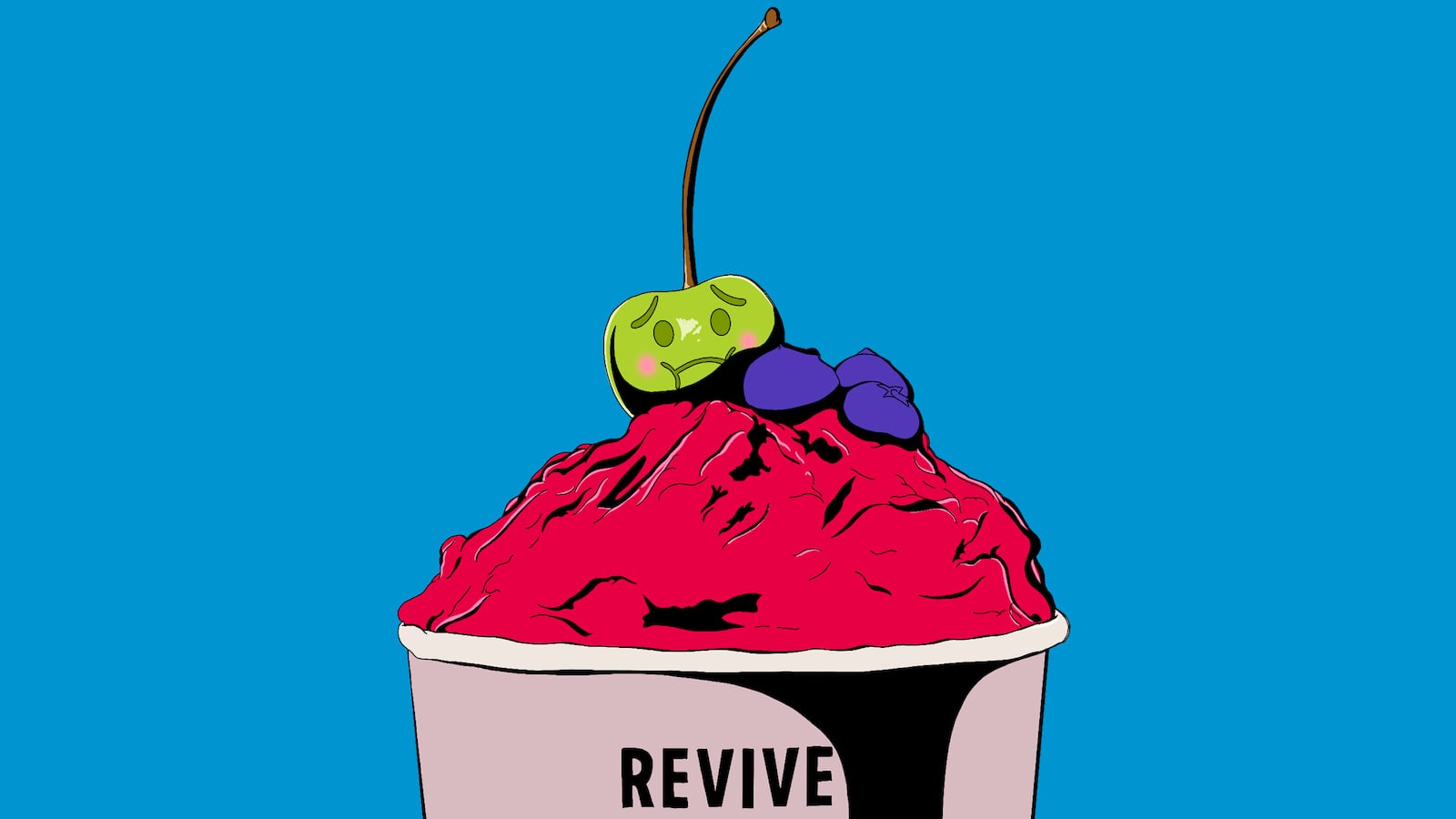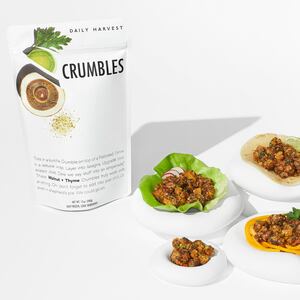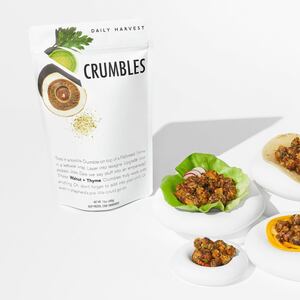More than 30 people say they developed fatigue, nausea, and even liver damage after drinking smoothies from Revive Superfoods, though the Canadian company has yet to issue an official recall and the FDA declines to confirm whether it’s investigating the matter.
The customers’ stories mirror a similar fiasco involving Daily Harvest, which recalled its lentil and leek “crumbles” in June after customers organized on Reddit, complaining of debilitating illness after eating the company’s frozen food product. Daily Harvest blamed the outbreak on tara flour, a relatively new ingredient derived from the seed pods of South American tara trees. Packed with protein, it seemed like a perfect fit for the vegan meal-kit service and its health-conscious clientele.
Revive customers are also blaming their illnesses on tara flour, one of seven ingredients found in the company’s mango pineapple smoothies. Revive first began selling the product last year, according to court documents and five customers who spoke to The Daily Beast about their experiences.
“In general, I think that consumers should avoid tara flour until the FDA has been able to conduct more investigations about it,” says Dr. Kathleen J. Melanson, a professor of nutrition and food science and the head of the Energy Balance Lab at the University of Rhode Island.
The mango pineapple-flavored smoothie no longer appears on Revive’s website. The company and its CEO, Yousuf Soliman, did not respond to multiple requests for comment from The Daily Beast.
While the FDA has received 386 total consumer complaints regarding the Daily Harvest crumbles, according to its website, the federal agency has not disclosed how many similar complaints it’s gotten about Revive products or if it’s looking into the company at all, even as evidence of long-lasting physical damage continues to mount. When asked whether the FDA is looking into Revive Superfoods, a spokeswoman told The Daily Beast in an email, “This is an ongoing investigation and as such we are not in a position to comment further on those details.”
Revive is now a defendant in two liability and negligence lawsuits filed in July in the Eastern District of New York on behalf of two plaintiffs who say they got sick from the company’s smoothies. Bill Marler, a Seattle-based food safety attorney, represents a group of about 30 additional people who say they got sick from Revive’s smoothies.
Some of Revive’s former customers say they received the products for free in exchange for publicity on their social media pages. Others say they switched from Daily Harvest to Revive, lured by the smaller company’s lower price points. Soon after trying the smoothies, however, they were beset with nausea and stomach cramps that developed over the course of hours until they eventually collapsed—some in the privacy of their own homes, and others in more public places, like a crowded cellphone store in the middle of the day. Some of the patients recovered over time, while others wonder if they’ll ever feel normal again.
“It’s definitely changed my life. I’m not the same I used to be,” says Zandi Holup, a musician and waitress from Nashville who was first admitted to the hospital after drinking a Revive mango pineapple smoothie in early March. “You drink one smoothie and, all at once, your liver is failing. That’s what blows my mind. There’s people who drink alcohol for years and they don’t have this happen to them.”
“I Thought I Was Dying”
Wendy Clark came across Revive online earlier this year and, after growing tired of Daily Harvest’s offerings, decided to take a chance on the lesser known company.
“I had placed three orders prior to losing my gallbladder, and each order had the mango pineapple that had the tara in it,” Clark, 42, tells The Daily Beast.
On Saturday, June 25, she prepared one of the mango pineapple smoothies, dumping its contents into a blender and mixing it with milk. Clark says she felt sick almost immediately, comparing the feeling to a “horrible hangover.” She didn’t eat anything all day, but was finally able to stomach a small meal around 7 p.m. She quickly started vomiting, accompanied by waves of excruciating stomach pains that left her lying on the floor.
“I thought I was dying,” Clark says.
She explained how she became virtually paralyzed by pain in a consumer complaint submitted to the FDA over the summer and shared with The Daily Beast.
“The pain was so severe, I had to call 911 to take me to the hospital as I live alone. I was lying in my own vomit, hardly able to move when I called, but I crawled to the door as they arrived,” she wrote in the complaint.
An ambulance picked her up within 15 minutes, but she waited almost eight hours in the emergency room at Chester County Hospital in West Chester, Pennsylvania.
“I’m with my mom, and the physician’s assistant came in and asked me, ‘Are you a big drinker?’ I’m an elementary school teacher; I couldn’t be a functioning drunk,” she tells The Daily Beast incredulously, as she describes doctors scrambling to figure out what was wrong with her. “Half an hour later, they came back and they said, ‘So, it’s your gallbladder and that’s what’s triggering these liver enzymes.’”

Wendy Clark at Chester County Hospital in June 2022.
Wendy ClarkBy Tuesday, she was lying on an operating table about to have her gallbladder removed. She was discharged the next day. Afraid to eat anything too heavy, and still unsure what caused that first bout of illness, she kept drinking the Revive smoothies. A week after her surgery, she developed the same symptoms, but with her gallbladder no longer there to bear the brunt of the illness, she felt better within a couple days.
It’s a cycle that’s all too common in these stories: after falling mysteriously ill, patients unknowingly go right back to the possible source of their illness, unaware that a seemingly innocuous product could be hurting them.
A similar thing happened to Danielle Burke, 48, a clinical psychologist in New York City. An order of 12 smoothies from Revive came out to $76, she says, beating Daily Harvest’s average price point of $8.49 per smoothie.
“I had three episodes of illness on January 25, May 22, and June 4, and it was only after I went through a whole bunch of stuff that I learned about the tara flour in the smoothies. I looked back at my records and I had received five deliveries that had the mango pineapple smoothie in them, beginning [at the] end of November until the most recent one in mid-June,” Burke tells The Daily Beast.
The first time, she went to bed and woke up with alternating chills and fever symptoms that were so bad she thought she might have contracted COVID-19. She walked to the bathroom to get some Tylenol, but collapsed on the floor from the pain. She also developed unexplained itching, which she’s since learned was likely pruritus, a symptom of liver damage. Her primary care doctor found that her liver enzymes were extremely elevated—a tell-tale sign of liver damage—and referred her to a hepatologist, who then sent her in for an ultrasound. The results came back normal.
“He hypothesized that I had passed a gallstone that blocked a bile duct and upset the liver,” Burke says. “We sort of left it there.”
When her pain returned in May, Burke was still drinking the smoothies “regularly,” she says. She spent a night at Mount Sinai Hospital in Manhattan, where most of the tests her doctors ran came back normal, though her liver enzymes were once again high. She was referred to a liver surgeon who diagnosed Burke with cholangitis, or inflamed bile ducts. The surgeon told her it was likely caused by a problem with her gallbladder.
“She told me she was going to meet with a team of 20 G.I. specialists to present my case to them,” Burke says. “She called me the next day and said the consensus of the team is there must be something going on with the gallbladder.”
Burke was then referred to an endoscopic ultrasound, but before she could get one, she had another episode. On June 4, she collapsed in a Verizon store near her home while trying to buy a new cellphone with her husband.
“Which was very embarrassing and terrible,” Burke recalls. “My husband managed to get me home.”
Ultimately, she had her gallbladder removed on June 28. She later filed a complaint with the FDA. The agency acknowledged it received Burke’s complaint on Aug. 11, according to an email shared with The Daily Beast.
“I hope they figure out what it is so this doesn’t happen to more people,” she says.
Burke’s story echoes that of Daniel Cohl, a Brooklyn man who filed a lawsuit against Revive in July.
According to his complaint, Cohl drank the smoothies—which included several of the mango pineapple flavors—for about three months starting on Dec. 2, 2021. By March 3, he began experiencing pain under his ribcage, itchiness, dark urine, “concerningly yellow” skin, and “concerningly pale” lips. Similar to Burke, his doctor also thought that gallstones were blocking his bile ducts. He spent three days in the hospital and continues to struggle with bouts of pain, his lawsuit alleges.
Farm to Operating Table
Daily Harvest pinned its customers’ illnesses on tara flour, issuing a letter in July after an “extensive investigation” that pointed to the ingredient as the culprit.
“I would be shocked if it’s not the tara,” says Marler, the food safety attorney representing Cohl and others in this story.
But the FDA has yet to independently verify whether the ingredient is to blame. It’s also not clear what about the tara, exactly, is making people sick.
Molinos Asociados, a Peru-based company that produces and exports products derived from tara trees and dubs itself a “leader” in the tara industry, says it hasn’t found anything wrong with the ingredient. The company confirmed to The Daily Beast that it supplied Daily Harvest with the tara for its lentil crumbles, but did not disclose whether it supplied Revive with the tara for its smoothies.
In an emailed statement to The Daily Beast, Molinos Asociados president Herbert Noriega emphasized that the FDA has not found “any direct link” between its tara and the Daily Harvest foodborne illnesses.
“All fingers were pointed to us since it was the only (they say) new product used by them!!!” Noriega said of Daily Harvest, adding that he is not aware how much tara Daily Harvest used or what their manufacturing process was like.
“It is important to know Tara fruit derivatives are in use for more than 30 years in Europe and the USA without any problem like this in the past,” Noriega added, telling The Daily Beast that his company is collaborating with the FDA in its ongoing Daily Harvest investigation.
Dr. Donald W. Schaffner, a food science professor at Rutgers University and the host of microbial food safety podcast Food Safety Talk, says not a lot is known about tara flour, regardless of how it’s used. Tara gum, a different derivative of the plant, has been widely used as a thickener for a while, he says, but tara flour appears to be a “relatively new ingredient.”
The FDA relies on a vague label, GRAS, which stands for “generally recognized as safe,” when deciding what products to allow for sale in the general market. Since the agency can’t possibly test every ingredient, it relies on companies to decide for themselves.
“Companies can say, ‘Hey, we believe this is GRAS.’ That seems to be what happened in this case,” Schaffner says.
In his opinion, the alleged resulting illnesses could come down to any number of things. It could be that the company harvested the wrong plant at the source, he posits, or that a toxin found its way into the ingredient. Another theory is that American populations are just more sensitive to tara because they’re not used to it.
“This is a weird kind of outbreak,” Schaffner says, adding that the FDA is more used to dealing with things like salmonella and E. Coli. “Anytime something shows up for the first time, it takes the agency a while. They have to be very careful, too. They don’t want to make a mistake and say something that later turns out to be incorrect.”
Reputation Management
Asked how Revive has handled the outbreak, former customer Tamara Kennedy, 53, says they haven’t. The Tampa-based customer care representative says she got sick twice, once ending up on an IV drip at the hospital after a battery of tests showed high bilirubin levels, a sign of bile duct issues.
“I haven’t heard from them,” she tells The Daily Beast. “I think they have the history to see who purchased this… I really don’t think they have handled it.”
Holup, the musician from Nashville, ended up spending a total of 20 nights in the hospital, with pain so bad that she remembers “screaming.” She says Revive clumsily offered her a refund for her PR box after she told them about her hospitalization.
“I said, ‘I didn’t even pay for this,’” she says.
Nadia Eletribi, the second of two customers who have brought suit against Revive so far, was hospitalized three times while consuming orders that included the mango pineapple smoothie. The first time was in March, about five weeks after the birth of her third child.
Eletribi still suffers from “significant pain and other physical discomfort,” according to her lawsuit, which claims damages in excess of $75,000 related to lost wages and future career advancement opportunities, as well as medical expenses.
She’s shocked that the company has yet to issue an official recall of the smoothies.
Dealing with liver enzymes that spiked three times means she now has to be careful when taking basic pain medication like Tylenol, which is filtered through the liver. She recently had an emergency root canal and opted for Motrin as an alternative.
“I really hope that this company will recall the item and let their people know that this could cause this kind of damage, and there’s justice served, because it was a very, very difficult, traumatizing time for me,” Eletribi says.
She’s also worried about the possible effects on her newborn son, who she’s still breastfeeding. After her own stint in the hospital, a pediatrician told her that one of his liver enzymes was higher than normal.
“That’s the biggest fear for me, that I could harm him in any way.”
These are issues most Revive customers never thought they’d have to worry about when choosing what they thought was a healthy, plant-based meal replacement.
“I had to work with my therapist on some PTSD issues,” Clark says, recalling the intense bouts of pain she suffered before, and even after, having her gallbladder removed. “You think you’re eating healthy because you’re paying a bajillion dollars for these fruit smoothies.”








